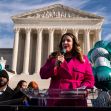Nearly a decade after a gay couple first went to court against a florist who refused to decorate their same-sex wedding venue, the U.S. Supreme Court declined to weigh in on the latest chapter in the clash between same-sex rights and religious beliefs.
The case began when a man named Robert Ingersoll asked Barronelle Stutzman, his longtime florist, to provide flowers for his same-sex wedding to Curt Freed. She refused to do so, explaining that her denial was due to her “relationship with Jesus Christ.” The attorney general of Washington along with Ingersol and Freed sued Stutzman for violating the Washington Law Against Discrimination (WLAD).
That law guarantees “The right to be free from discrimination because of race, creed, color, national origin, citizenship, immigration status, sex…sexual orientation”, and several other characteristics. In rejecting Stutzman’s arguments, the Washington Supreme Court quoted from the plaintiff’s brief that said, “This case is no more about access to flowers than civil rights cases in the 1960s were about access to sandwiches.”
Stutzman told the New York Times, “Since 2012, same-sex couples all over the state have been free to act on their beliefs about marriage, but because I follow the Bible’s teaching that marriage is the union of one man and one woman, I am no longer free to act on my beliefs.” The Washington Supreme Court ruled for the state, prompting Stutzman to seek cert from the U.S. Supreme Court. She asked the justices to weigh in “to ensure that people of faith have the freedom to live according to their beliefs about marriage.”
The High Court sent the case back to Washington in light of its ruling in a Colorado case with similar facts. In Masterpiece Cakeshop v. Colorado Civil Rights Commission, a baker, who refused to make a wedding cake for a same-sex couple, won his case because he believed the state law, similar to the one in Washington, violated his religious beliefs. The opinion, written by Justice Anthony M. Kennedy, said, “While the issues here are difficult to resolve, it must be concluded that the State’s interest could have been weighed against Phillips’ (the baker) sincere religious objections in a way consistent with the requisite religious neutrality that must be strictly observed...” Kennedy criticized some “expressions of hostility to religion” in some of the commissioners’ (members of the Colorado Civil rights commission) comments. He said they were “inconsistent with the Free Exercise Clause.” But the court did not specifically spell out whether and when the Constitution would more broadly require an exemption to a state nondiscrimination law.
In 2019, after the ruling Masterpiece Cakeshop, the Washington Supreme court again ruled for Ingersol and Freed. The court reiterated that Stutzman did not have a constitutional right to ignore the law that forbade any business that was open to the public to discriminate on the basis of sexual orientation. They reasserted that WLAD prohibits discrimination on this basis. Stutzman then asked the U.S. Supreme Court to step in and “ensure that people of faith have the freedom to live according to their beliefs about marriage, and to bar governments from mandating which sacred events merit celebration.” The court did not immediately consider her case, presumably according to the Scotus Blog because the justices wanted to wait until they issued another related decision.
That case was a challenge to Philadelphia’s refusal to make referrals to the Catholic Social Services (CSS) because the faith-based agency would not consider the applications of same-sex couples who wanted to become foster parents. In that case, the Court unanimously ruled that Philadelphia violated the free exercise rights of CSS when it denied a contract based on the agency’s refusal to comply with the city’s policies that prohibited discrimination. That unanimous opinion, written by Chief Justice John Roberts, was based on the specific language of the city’s contract and its definition of government interest.
Scotus Blog’s review of the opinion concluded, “…the court seemed to rely on a single fact — the prospect of exceptions — both to trigger strict scrutiny and to conclude that the city cannot meet that standard. The failure to seriously engage the city’s arguments allowed the court to avoid key questions that make these cases difficult.”
On July 2, the court again did little to answer several of these key questions. It declined to hear Stutzman’s case because four votes are required to bring a case before the whole court, and Stutzman received three—from Justices Clarence Thomas, Samuel A. Alito Jr. and Neil M. Gorsuch.
Now, key questions remain. Does WLAD, and similar anti-discrimination laws in 40% of U.S. states, violate the First Amendment rights of people who do not wish to provide services to same-sex couples because of their religious beliefs? Are these laws hostile to religion?
Current rulings are difficult to reconcile and understand. In denying the petition, same-sex couples in Washington can order florists to provide custom flowers for their weddings. But couples in Colorado can’t get custom wedding cakes unless a revised contract constitutionally spells out new rights. These rulings are likely to confuse lower courts and those who seek rights under state anti-discrimination laws.
The florist’s case has been called a “modest decision” that has the “virtue of judicial restraint.” Even if there were to be more clarity, only 60% of U.S. states even have anti-discrimination laws that provide protections for same-sex couples. Unfortunately, as of now, neither business owners who want much more consideration of their religious beliefs, nor gay and lesbian couples who want guaranteed entitlement to equal treatment, have clarity.
That will have to come in another case. Or maybe it will take several cases.






